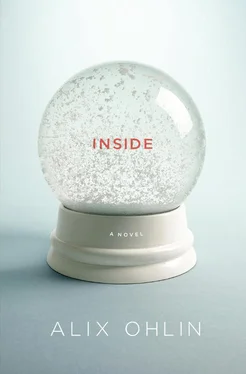From a skinny, spastic boy Malcolm had grown into a round-bellied, amiable, balding man with a moustache and a constant smile. Being around him relaxed Mitch when nothing else would. On his visits to the house he felt like just one more happy addition, inconspicuous but loved, with little demanded of him, much like the rabbit. It didn’t matter that he slept on the couch or, when he woke up in the morning with a burning sensation in his leg, found a Transformer action figure wedged under his thigh, or that Emily, the youngest, threw up on him in the backyard after a game of tag they were all playing got a little too rough. The children beat up on him, included him in their games, and left him alone when he said he was tired. The place was dirty and hectic and he could disappear into it, losing track even of himself, like he couldn’t anywhere else.
He didn’t know how Malcolm had managed to become such a good father without having a model for it, nor did he know how he and Cindy still managed to laugh at each other’s jokes and argue cheerfully about whose turn it was to cook or do the dishes. Malcolm wasn’t an especially successful engineer; he had made it to a certain level and hadn’t been promoted further in years. He wasn’t a particularly good cook, either, or hilarious or even all that hardworking. Cindy complained that he was disorganized, useless at home repairs, and not very good with money. He wasn’t good about asking Mitch questions about how things were going. His sole talent, one he’d had since childhood, was the best imaginable, and it had surrounded him his entire life, flexible, capacious, grown to embrace his wife, their family, their house, and, when he was around, even his brother. He had the gift of being happy.
It was always a shock for Mitch, after leaving those crowded confines, to find himself back in his quiet apartment in Westmount. He could hear his downstairs neighbors, a gay couple, entertaining a group of friends to gales of laughter.
The future he was looking at was without color, without noise. Hopelessly quiet. He spent the night awake, unable to shut out the silence that had taken over his life.
And so he was alone. To combat this solitude he had but few weapons: his job, his routine, and, increasingly, Grace and Sarah. October became November and he continued to help them as best he could. Grace’s cast had been removed and she was walking again, though she still winced at times and there was a stiffness in her movements, in the hunch of her shoulders, that made her look older than she was. Four days a week she went to rehab and returned home exhausted, close to tears, even though, as she told Mitch, most of the time she was lying down while the trainer pushed her legs in one direction and then another, working on her mobility. “You wouldn’t think it would hurt so much, but it does,” she said. “By the end of it I want to throttle this poor nice woman who’s just trying to help me. It’s like when Sarah was born and I told the doctors I hated them.”
“You hated the doctors? Why?” Sarah called. She was in the other room but had the smart child’s habit of listening closely at inconvenient times.
Grace grimaced. “I didn’t really hate them,” she said. “I just thought I did.”
Sarah came into the kitchen, where Grace and Mitch were sitting at the table, with a drawing dangling from her hand. Her forehead was creased with concern. “Because it hurt when I was born?”
“It hurt a little at first,” Grace said carefully, “but then it didn’t. And then you came out, and I was so happy.” She drew her close and wrapped her in a hug. Sarah buckled her arms around her mother’s waist, squeezing hard, and Mitch saw Grace clench her teeth in pain. She kissed Sarah’s head and said, “Now go back to your drawing. Don’t you have homework to do?”
“I finished it,” Sarah said, and left the kitchen, her troubles apparently forgotten.
Mitch brought Grace a glass of water and a couple of Tylenols, knowing her well enough to tell when she needed some. There was an extra weariness to her face, as if her head weighed too much for her neck, and her eyes grew blurry and vague.
“Thank you,” she said.
Mitch had stopped coming around as much, since now she could do almost everything herself. But he continued to run a few errands, adding their usual weekly groceries to his, stopping by to change lightbulbs, take out the trash, fix the shower rod, things she wasn’t up to yet. He had grown used to the shape and purpose these activities gave to his days, and he looked forward to Sarah’s happy greeting and his chats with Grace. By this point he wasn’t sure if he was helping or being helped, or whether the distinction even mattered. He and Grace were casual together, having slipped into a practical, easygoing friendship. Eventually she wouldn’t need his assistance at all, and he didn’t know if they would continue to be part of each other’s lives.
One day, Azra was coming up the steps as he was leaving the apartment. He had last seen her in mid-September, back when Grace was utterly prone.
“Hey!” he said, and gave her a quick hug, only noticing as he drew back that her expression was less friendly than quizzical.
“Hi,” she said. “What are you doing here?”
“What do you mean?”
She looked flustered. “Nothing, I guess. You’re still helping out? That’s nice.” It was a poor recovery; obviously she found his presence unexpected and strange.
“Well, not all the time or anything,” he answered lamely, wondering, even as he spoke, why he was acting like it was something to be ashamed of. “Grace hasn’t mentioned it?”
“No,” Azra said, “she hasn’t.”
Together they absorbed the implications of this remark. The only way he could think to end the awkward pause was to tell her he had to be going.
Back at the apartment, he resolved not to call or visit Grace unless she specifically asked him to, and felt a flush of shame whose source he couldn’t explain. Should he feel bad for having been there in a time of need?
But it turned out he couldn’t keep the resolution. He enjoyed the time he spent with the two of them, and he and Grace were getting along well. There was no reason, he told himself, that they couldn’t be friends. The following weekend, he called her up and proposed various plans for an afternoon outing. This was what Martine would have expected: an exhibit at the museum, or a new children’s movie, or he could teach them how to fly a kite. He had researched the possibilities beforehand.
Grace sounded touched but puzzled. “That seems pretty ambitious,” she said. “We’re more like not-goers. Not-doers. Sometimes we go to the park.”
This took him aback. “So what do you usually do on the weekends? Or used to, I mean, before the accident.”
Every child he knew — and this included his niece and nephews — faced a battery of activities and playdates on Saturdays and Sundays. They started playing competitive sports before they were five, and their lives were enriched by music lessons and art classes as soon as they could walk. For Grace to buck the trend so completely was not, he thought, quite like her. Then again, maybe he didn’t really know what she was like.
“Not much,” she said. “Why don’t you come over?”
So he did. Grace sat on the couch, as she had throughout her recovery, surrounded by a disassembled newspaper, some unanswered mail, a mug of tea, and a half-eaten sandwich on a plate. Sarah lay in front of her on the carpet, working on a jigsaw puzzle, her long blond hair in two braids. In the kitchen, talk-radio voices debated some issue, though Grace didn’t seem to be listening.
She offered him a cup of tea, a snack, maybe a book — should he have thought to bring one himself? — all of which he declined. Instead he sat opposite the two of them in an armchair, with the front section of The Globe and Mail in his lap. He was thinking that this was the most feminine scene he had ever witnessed in his life. Maybe his mother would have liked to have a Saturday like this, instead of taking him and Malcolm to the park and watching them beat each other over the head with sticks.
Читать дальше












